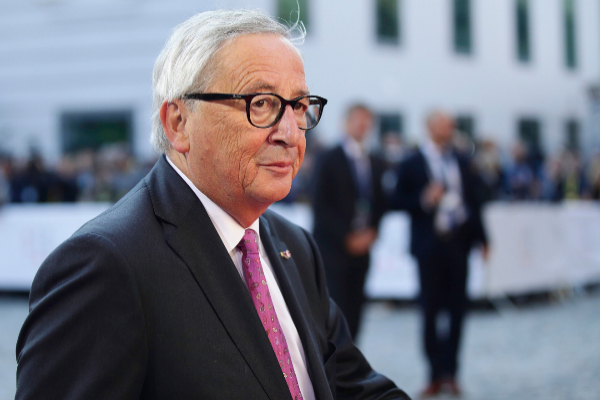- Farewell "City of Europe and fight against stupid nationalisms"
- The European Parliament gives the green light to the Von der Leyen Commission
- EU: Von der Leyen Commission, ready to start without a Brit
There are no leaders in Europe like Jean-Claude Juncker. With his retirement this coming Sunday, and the passing of the witness to Ursula von der Leyen, an era ends in a certain way and in Brussels the phrase that is repeated most is that he will be greatly missed. Juncker, former Luxembourg Prime Minister for three years, Minister of Economy, first President of the Eurogroup and since 2014 President of the European Commission, is the best exponent of a continent, some forms and a vision of politics that no longer exist.
A place and time in which leadership was mitigated by words of honor, in closed meetings, with early morning understandings among great leaders, with cigars and brandy. They were the generational exponents of the EU that was born from the ruins of the war and its disciples; the EU of the six founders. The EU of ambassadors, institutions and discretion. From language and bureaucratic structures, from depoliticization for survival after too much drama. Of the Treaties, the Conventions and the Great Coalition. That of a sincere, genuine Europeanism, born of butchers and the need for twinning, which tirelessly denounces "stupid nationalism" and warns of the dangers of populist and demagogic rhetoric. But a Europeanism, too, that is done by the people, for the people, but rarely with the people.
Juncker has been, is, a great politician. Bright, witty, extraordinary over short distances. Irreverent, funny, chaotic. The 'Guardian of the Treaties' and, above all, the secrets of the continent for a quarter of a century. With charisma, personality and an extraordinary vision of Europe, its recent history and the need to preserve its integrity at all costs. Uncorrectable and uncontrollable, able to kiss bald, embrace out of context or accuse the European Parliament of "ridiculous" before an empty capacity.
It is also a leader that has become obsolete. With a more than delicate health, a biblical disinterest in everyday life and management, a chief who delegates the operation of the presiding institution. With a very lax attachment to rules and organization. Used to assistants, chauffeurs and advisors who make it unnecessary to step on, listen to or understand the outside world. With powerful ideas, but they have not been updated for a long time.
The Luxembourgian has symbolized the best and worst of this Union. He is someone sensitive, who gets excited and transmits his feelings without hesitation. That he has seen his idols and teachers die and die. Able to unclog the most complicated Gordian knots without using a sword. He knows how to read people, their insecurities, their fears. The greatest exponent of the leader who does not give up, puts the cheek as many times as necessary if he knows that the cause is worth it. That deals with friends, neighbors and rivals until finding points of union.
But also someone who continues to see the world as it was two decades ago and who acts as if the only Europe that counts is that he can reach in two hours of travel from his residence. Berlin, Paris and little else. He does not understand, nor has he endeavored to understand, the east or the south and has hardly moved or tried to get his word to reach those corners. He is someone classic, ideal to deal with others like him, but too old and too conservative to adapt to other styles, languages and messages.
A cynical capable of applying 'tax rulings' for half a life and selling shortly after how important a fair taxation is. To laugh saying that "when things get serious, you have to lie" and that politicians like him know what to do, "but not how to be re-elected" if they put it into practice. That values institutions as something sacred, but twists them when necessary.
In 2015, when the wars pushed hundreds of thousands of people to seek refuge in Europe, the Commission made a proposal to distribute the arrivals across the continent. The president underestimated the resistance of many governments, dismissed his protests, did not understand the substance of the issue in his own political family. The clash with the east almost breaks Schengen has left very visible scars and has not worked. Asked if he would change the things he did, he maintains that he doesn't. That was the right thing, that the institutions had approved. That crisis, that problem, could not be solved like dairy, fishing or agricultural deals, and has never accepted it.
Juncker, an increasingly prudent, content and resigned old federalist, grew up, lived and helped develop that Europe that rose from crisis to crisis, moving slowly but steadily moving forward. However, problems have accumulated for a long time and the responsibility is a good part of their generation and their inability to adapt to modern changes, challenges and realities. In these last five years, he has had critical moments in which he has doubted, repressed or surrendered, and sacrificed courage and ambition in exchange for consensus. In his career he has loved Europe, he has done what he thought was best to take care of it and has sacrificed even his health. But that, as in any relationship, sometimes is not enough.
According to the criteria of The Trust Project
Know more- Europe
- Jean-Claude Juncker
- European Union
- Ursula von der Leyen
- European Parliament
- Eurogroup
- European Comission
European UnionThe Von der Leyen Commission, ready to start without a Brit
GERMANY Angela Merkel, cheered at the CDU congress: "We want a strong Germany in a strong Europe"
Monetary policy Bad times for saving: 150,000 million have left Europe in just three years

